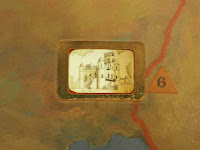

While in Addis Ababa [three weeks ago now], I visited the national museum. It has some interesting artifacts and paintings, but none of it is the Real Reason to go there. So I'm going to keep those pictures small. You can see more detail by clicking on them.
The brands on the top right were used in place of signet rings to mark who stuff belongs to. I think they look pretty cool. I could go for that. On the left, you see a teeny rendering of Gondar, once the capitol city and also known as the Camelot of Ethiopia. Of course, all I can think about is Gondor, and it's one more proof that life really did begin in this neighborhood.
On the right is a massive throne. The seat itself is about at my waist height and the chair is more than a story tall. They have some interesting ceremonial garb.
There was a group of school children there. That was fun because some of them wanted to see a little model city outline on a pedestal but couldn't reach. Using appropriate international sign language, I picked one of them up and let her see. The grin I got in response was precious.
Upstairs they have some pictures I rather enjoyed. Among the things that makes Ethiopia interesting to me is the history of Judaism and early Christianity there. (
Did you know Ethiopia is mentioned in Isaiah?)
A painting commemorating the
1984 famine.
The real reason to go to the museum is to meet Lucy. She's buried in the basement. But she isn't conveniently located at the beginning of the downstairs where the other 2-4 million year old skulls are. She's down a lot of corridors and turns to force you to see the rest of the saber toothed bunny rabbits and gorgons and whatnot you didn't come here to see are before you finally find....







